Hey there, fellow food lovers! If you’re wondering, “how long do you fry chicken legs on the stove,” you’ve stumbled into the right kitchen. I’m gonna spill all the juicy details on getting those legs crispy, tender, and downright delicious without burning down the house. We’ve all been there—staring at a pan, wondering if the chicken’s done or if it’s still raw in the middle. Well, worry no more! Let’s break this down step-by-step with all the tricks I’ve picked up over the years.
Spoiler alert: It usually takes about 12-15 minutes per side on medium heat for bone-in chicken legs, but there’s a lotta factors at play. Stick with me, and I’ll show ya how to nail it every time.
Why Timing Matters When Frying Chicken Legs
First off let’s get why timing is such a big deal. Chicken legs ain’t like a quick-cook steak. They’re thicker, often bone-in, and got that dark meat that needs proper heat to cook through without drying out. Undercook ‘em and you’re risking some nasty food poisoning. Overcook ‘em, and you got yourself a rubbery, sad mess. So, when we talk about “how long do you fry chicken legs on the stove,” we’re really talkin’ about balancing that perfect golden crust with juicy insides.
Here’s the quick and dirty on timing
- Bone-in chicken legs: 12-15 minutes per side (24-30 minutes total) at medium heat.
- Boneless thighs or legs: 8-10 minutes per side (16-20 minutes total).
- Heat level: Medium to medium-high, around 350°F if you got a thermometer for the oil.
But hold up, it ain’t just about the clock. Size of the legs, pan type, and even how much oil you’re using can mess with this. Let’s dive deeper.
What You Need to Know Before You Start Frying
Before we even turn on the stove, let’s prep like pros. I’ve botched plenty of chicken in my day, and trust me, skipping these steps is a recipe for disaster.
- Pick the Right Legs: Fresh or thawed, bone-in or boneless—know what you’re working with. Bone-in takes longer, but it’s got more flavor. Boneless is quicker but can dry out if you ain’t careful.
- Pat ‘Em Dry: Wet chicken = no crisp. Grab some paper towels and pat those legs dry. This helps the skin get that golden crunch.
- Season Like You Mean It: Salt, pepper, paprika, garlic powder—whatever you fancy. Rub it in good. I like tossing in a lil’ cayenne for a kick.
- Choose Your Oil: Use somethin’ with a high smoke point like vegetable oil or canola. Olive oil’s fine for flavor, but it burns easy. You want about ¼ inch of oil in the pan for pan-frying.
- Get a Good Pan: Cast iron or a heavy skillet is your best bud. It holds heat nice and even. Non-stick pans? Meh, they work, but you won’t get the same sear.
Pro tip Let the chicken sit out for 20-30 minutes before cooking. Cold meat straight from the fridge cooks uneven and we don’t want that.
Step-by-Step: Frying Chicken Legs on the Stove
Alright, let’s get to the main event. Here’s how I fry chicken legs on the stove, and trust me, this method’s been tested in my chaotic kitchen more times than I can count.
- Heat Up the Pan: Pour that oil in your skillet and set it to medium or medium-high heat. You want it hot but not smokin’—around 350°F if you got a thermometer. No thermometer? Drop a lil’ breadcrumb in. If it sizzles right away, you’re good.
- Lay ‘Em Down: Place the chicken legs skin-side down in the hot oil. Don’t overcrowd the pan—give ‘em space to breathe. Two or three at a time is plenty for most skillets.
- Fry First Side: Let ‘em cook for 12-15 minutes if bone-in, 8-10 if boneless. Don’t mess with ‘em too much. You want that skin to crisp up nice. Peek after 10 minutes—if it’s golden brown, you’re on track.
- Flip and Repeat: Turn ‘em over and cook the other side for another 12-15 minutes (or 8-10 for boneless). The goal is even cooking, so adjust the heat if it’s browning too fast.
- Check for Doneness: Best way is a meat thermometer—internal temp should hit 165°F near the bone. No thermometer? Cut into the thickest part. If the juices run clear and there’s no pink, you’re golden.
- Rest ‘Em: Pull the legs out, let ‘em sit on a paper towel or rack for 5 minutes. This keeps the juices locked in so they don’t spill all over your plate.
Now, I know what you’re thinkin’—what if they’re burning or not cooking through? Hang tight, we’ll cover troubleshooting in a sec.
Frying Times Table for Chicken Legs
Since timing can vary, I whipped up this lil’ table to help ya out. Adjust based on your setup and the legs you got.
| Type of Chicken Leg | Heat Level | Time Per Side | Total Time | Internal Temp |
|---|---|---|---|---|
| Bone-in, average size | Medium (350°F) | 12-15 minutes | 24-30 minutes | 165°F |
| Bone-in, large/thick | Medium (350°F) | 15-18 minutes | 30-36 minutes | 165°F |
| Boneless thighs/legs | Medium (350°F) | 8-10 minutes | 16-20 minutes | 165°F |
| Bone-in, medium-high heat | Medium-High (375°F) | 10-12 minutes | 20-24 minutes | 165°F |
Remember, these are rough guides. If your stove runs hot or your pan ain’t great, you might need to tweak it a bit.
Common Mistakes and How to Fix ‘Em
I’ve screwed up frying chicken legs more times than I care to admit, so let me save ya from my headaches. Here’s the stuff that goes wrong and how to deal.
- Burnt Outside, Raw Inside: Happens when the heat’s too high. Lower it to medium, and cover the pan with a lid for part of the cooking to trap heat and cook the inside. Flip more often if needed.
- Soggy Skin: If you didn’t pat the chicken dry or the oil wasn’t hot enough, you’re stuck with sad, limp skin. Crank the heat a lil’ before adding the legs, and always dry ‘em first.
- Sticking to the Pan: Forgot to oil enough or moved ‘em too soon. Make sure there’s a good layer of oil, and let the skin sear proper before flipping—don’t force it.
- Uneven Cooking: Crowded pan or cold chicken. Cook in batches, and let the legs warm up a bit before tossing ‘em in.
- Not Sure If It’s Done: Don’t guess and risk salmonella. Get a cheap meat thermometer, or do the juice test I mentioned. Better safe than sorry, ya know?
Extra Tips for Next-Level Chicken Legs
Now that we got the basics down, let’s kick it up a notch. These lil’ tricks will have your family or friends beggin’ for seconds.
- Double Fry for Crunch: Fry at a lower temp (like 325°F) for 10 minutes per side to cook through, then crank it to 375°F for 2-3 minutes per side for extra crisp. Game-changer, I swear.
- Marinate for Flavor: Soak those legs in buttermilk, hot sauce, or even yogurt with spices for a few hours before frying. It tenderizes and adds a punch of taste.
- Herb It Up: Toss some rosemary or thyme in the oil while frying. It infuses a crazy good aroma. Just don’t burn the herbs—pull ‘em out if they blacken.
- Breading Option: Want that KFC vibe? Dip the legs in flour or a mix of flour and cornstarch after seasoning. Shake off excess, then fry. You’ll thank me later.
- Safety First: Hot oil’s no joke. Keep a lid nearby to smother any flare-ups, and never leave the stove unattended. I learned that the hard way with a small grease fire—don’t be me.
Variations to Spice Up Your Chicken Legs
If you’re tired of the same ol’ fried chicken, switch it up! Here’s a couple ideas to play with once you’ve mastered the timing.
Spicy Honey Glaze
After frying, mix up some honey with a dash of hot sauce and a pinch of garlic powder. Brush it on while the legs are hot. Sweet, sticky, and fiery—my kinda combo.
Garlic Butter Finish
Melt a knob of butter with minced garlic in a small pan. Drizzle it over the fried legs right before serving. It’s rich, it’s garlicky, and it’s freakin’ divine.
BBQ Style
Rub the legs with your favorite BBQ seasoning before frying, or baste ‘em with BBQ sauce in the last 2 minutes of cooking. Watch the sauce though—it burns easy.
Pairing Your Fried Chicken Legs
What’s fried chicken without some killer sides? Here’s what I love throwing on the plate with mine:
- Mashed Taters: Creamy, buttery, with a lil’ gravy if you got it.
- Coleslaw: Cuts through the richness with that tangy crunch.
- Corn on the Cob: Sweet and simple—boil or grill it, don’t matter.
- Biscuits: Fluffy and warm, perfect for soppin’ up juices.
- Mac ‘n Cheese: ‘Cause why not? It’s comfort food central.
Why Frying on the Stove Beats Other Methods
You might be wonderin’, why bother with the stove when you can deep-fry or bake? Here’s my two cents on why stovetop frying is where it’s at.
- Control: You can adjust the heat on the fly, flip as needed, and keep an eye on every step. Deep fryers are a black box sometimes.
- Less Oil: Pan-frying uses way less oil than deep-frying, so it’s a bit healthier and less of a mess to clean up.
- Flavor: That sear you get in a skillet? Unmatched. Baking just don’t give you the same crust.
- Accessibility: Not everyone got a deep fryer, but we all got a pan and a stove. It’s practical, ya feel me?
Cleaning Up After the Fry Fest
I ain’t gonna lie—frying chicken legs leaves a mess. Oil splatters, greasy pans, the works. But here’s how I handle it without losing my mind.
- Cool the Oil: Let the used oil cool completely, then pour it into an old jar or can. Don’t dump it down the sink unless you want a plumbing nightmare.
- Wipe First: Use paper towels to soak up grease from the pan before washing. Makes scrubbing easier.
- Hot Water and Soap: Hit the skillet with hot water and dish soap. If it’s cast iron, skip the soap and just use hot water with a scrubber to protect the seasoning.
- Splatter Cleanup: Wipe down the stove and counters with a degreaser or vinegar solution. Them oil spots are sneaky.
Wrapping It Up
So, back to the big question: how long do you fry chicken legs on the stove? For most bone-in legs, you’re lookin’ at 12-15 minutes per side on medium heat, totaling 24-30 minutes. Boneless cuts take less, around 8-10 minutes a side. But remember, it’s all about checkin’ for that 165°F internal temp or clear juices to be sure they’re done. We walked through prepping, frying step-by-step, fixing mistakes, and even jazzin’ up the flavor with some cool twists.
Frying chicken legs ain’t rocket science, but it does take a lil’ patience and practice. I’ve burned my fair share, and I’m still learning new tricks. So, grab that skillet, throw on some tunes, and get to frying. You got this! Drop a comment if you try any of my tips or got a killer recipe to share—I’m always down to swap ideas.
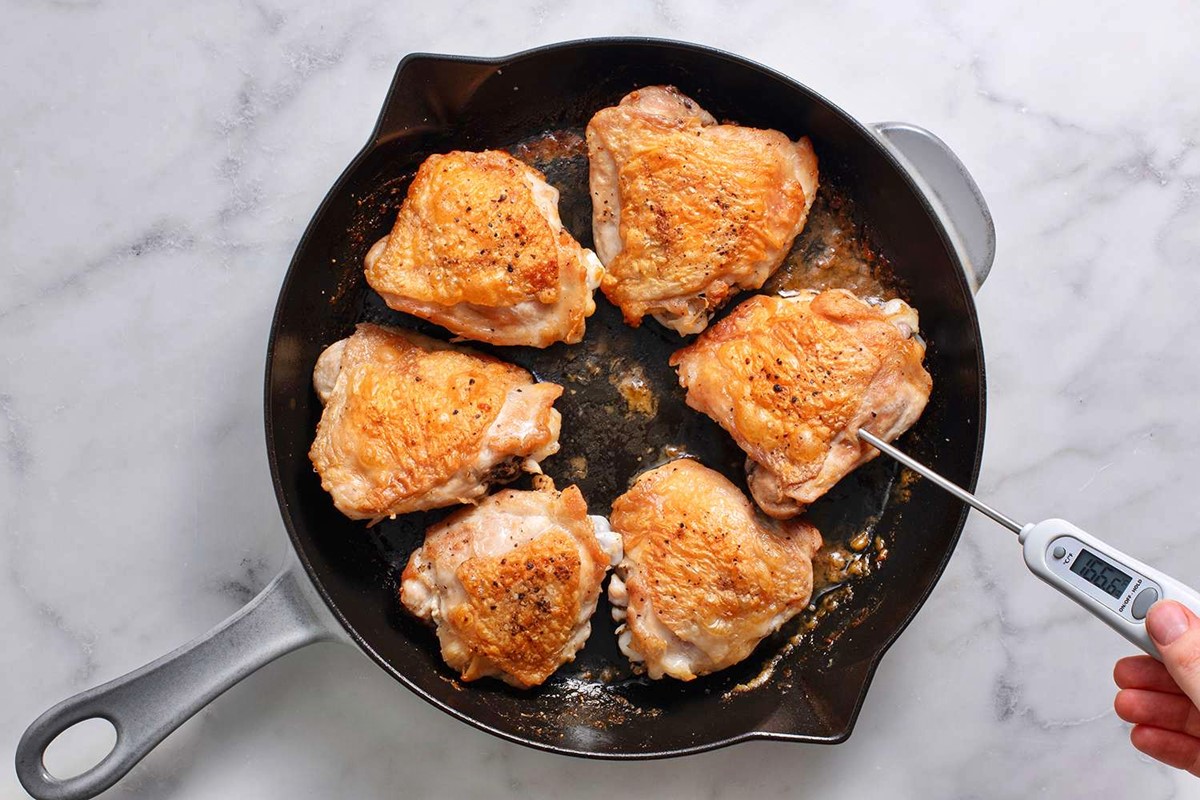
The Best Oil for Deep Fried Chicken
Choosing the right oil to fry chicken livers can feel daunting because of all that’s available. But two things are worth considering—flavor and smoke point (the temperature the oil begins to smoke and become bitter). And a neutral flavor won’t overpower the chicken.
Generally, vegetable oil works because its high smoke points and neutral flavors let your seasonings shine. Peanut oil is also great if you’re not allergic and love the pleasantly nutty taste. Safflower or canola oil seems to be a healthier choice because of their higher smoke point (450°F/232℃) and lower saturated fat.
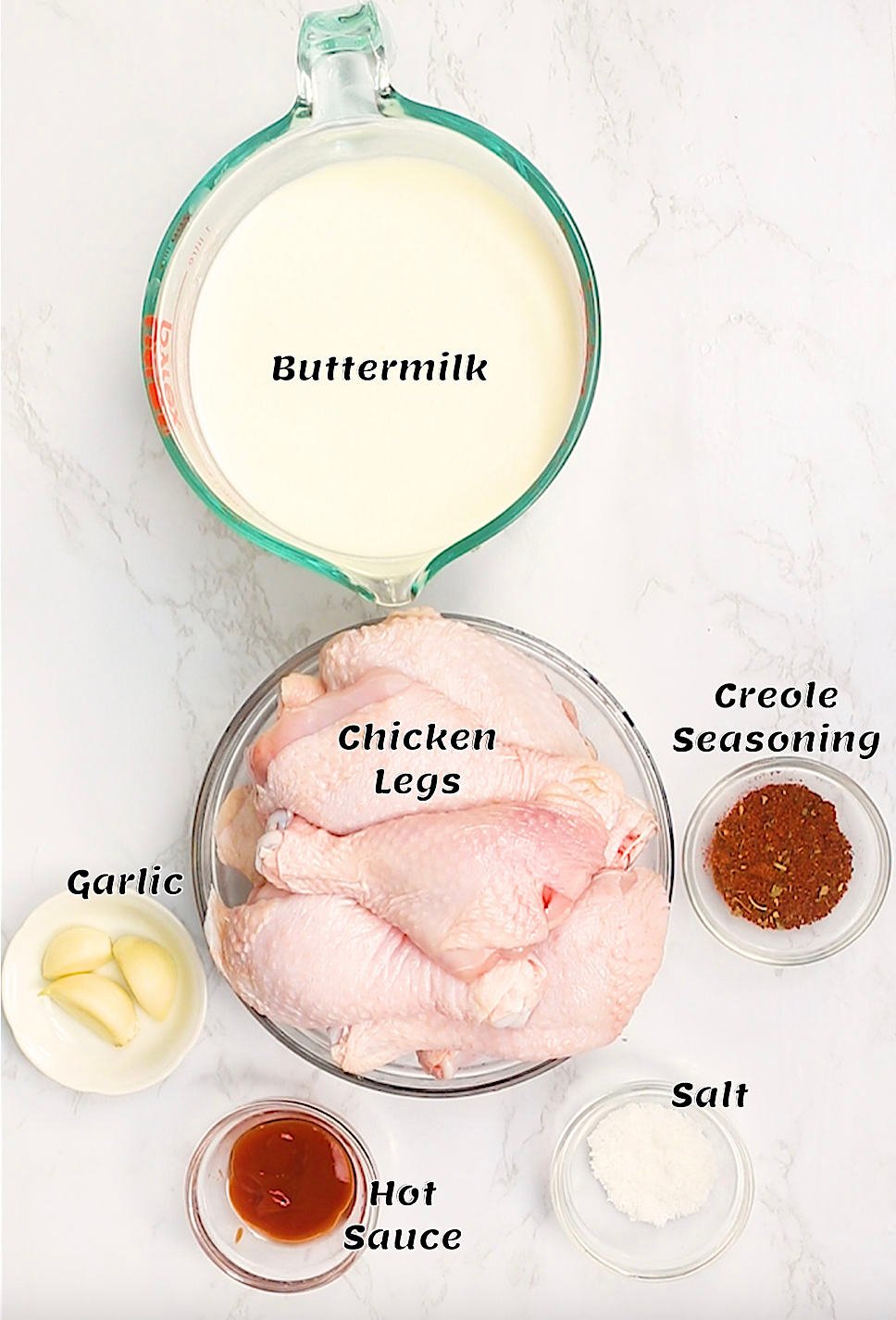
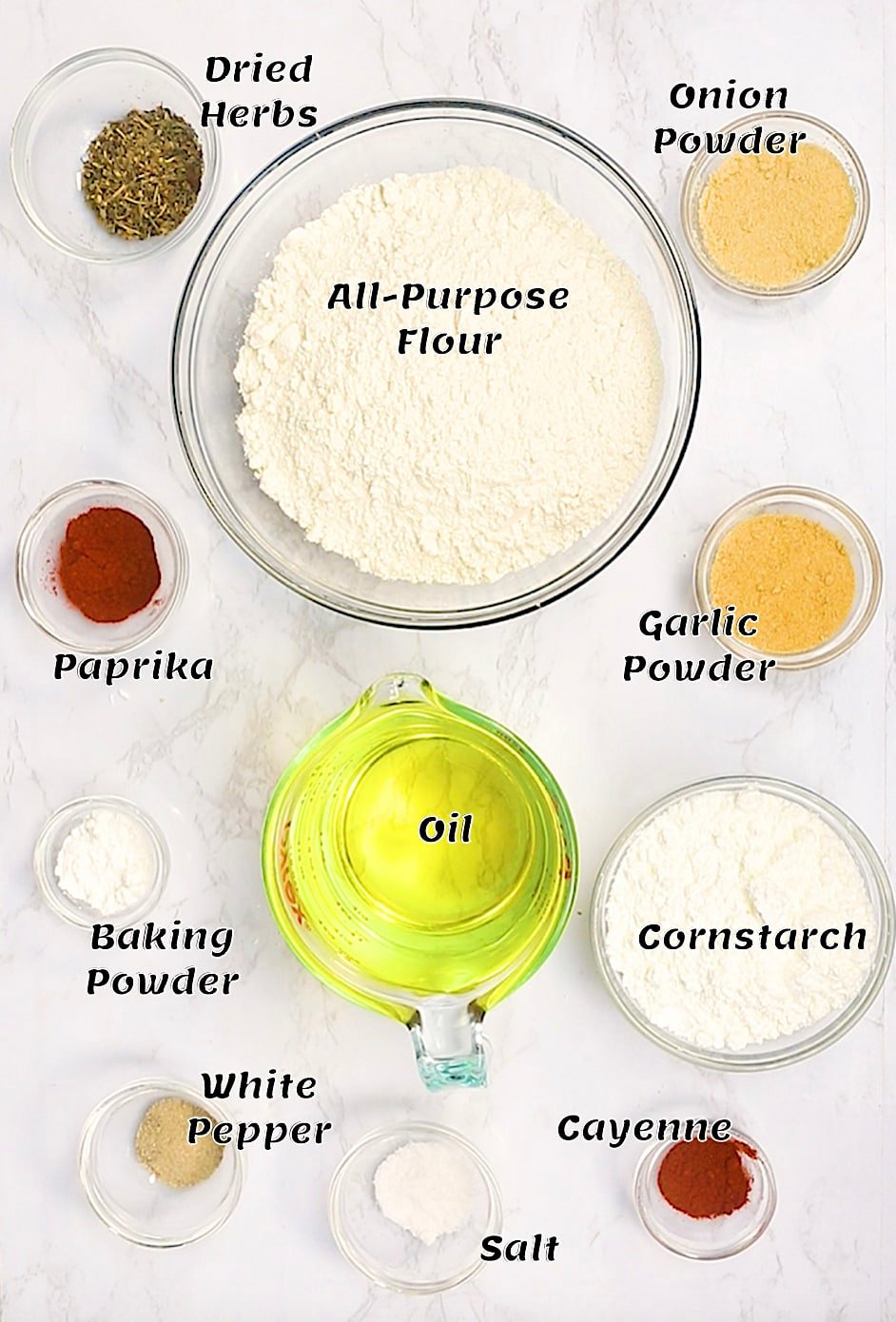
- Chicken Legs – If you want juicy, fall-off-the-bone chicken, the legs and thighs are where it’s at.
- Marinade – Buttermilk, hot sauce, garlic, Creole seasoning, and salt deliver a marinade that won’t let you down!
- Seasonings -Paprika, garlic powder, onion powder, cayenne pepper, white pepper salt, and dried herbs (thyme, oregano, parsley, etc.)
- Breading – The seasoned flour, cornstarch, and baking powder provide an incredible crunch. Cornstarch and baking powder also make the coating extra crisp with a lighter texture.
How to Deep Fry Chicken Legs
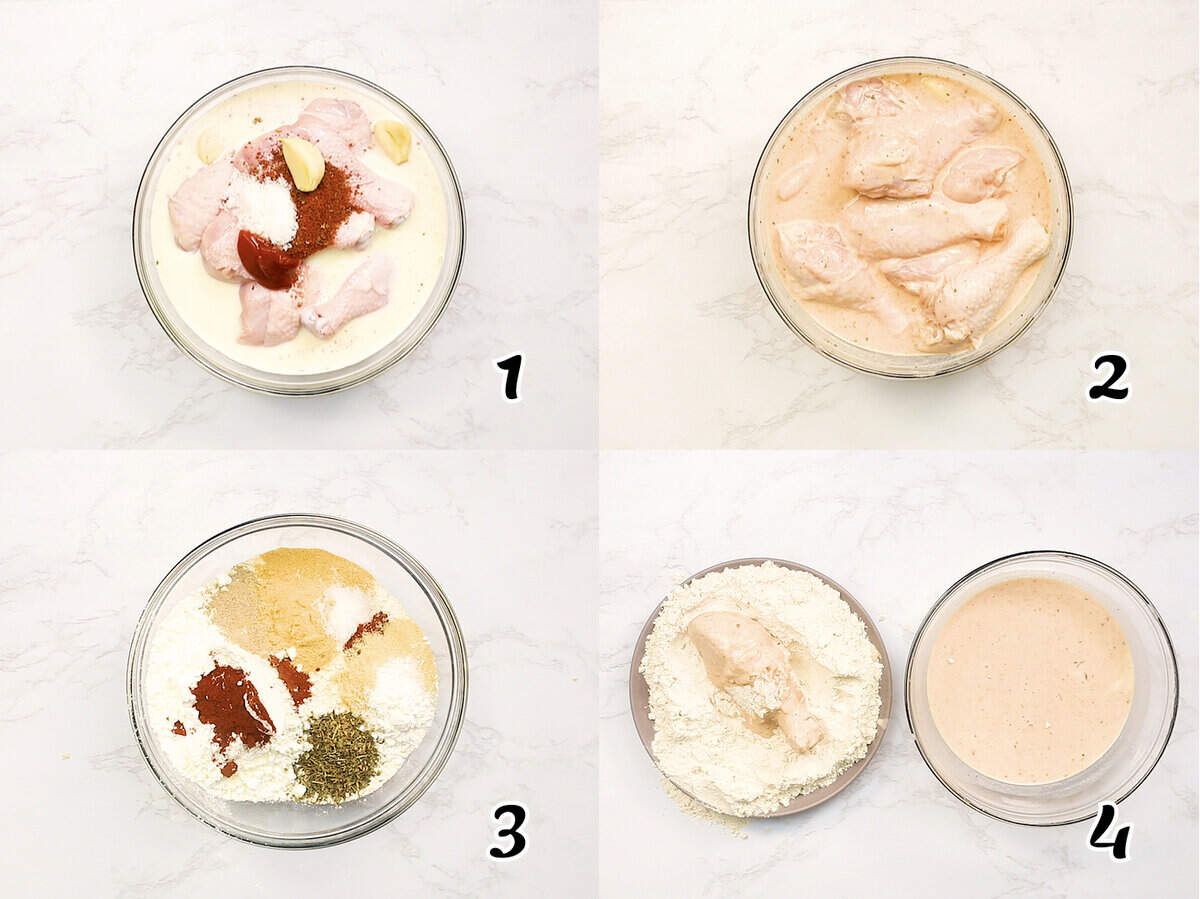
Prepare Chicken
- Prep Chicken – Place the chicken legs in a large bowl, and season it with salt, garlic, hot sauce, and Creole seasoning.
- Marinate – Pour some buttermilk over the seasoned chicken and mix until all the chicken legs are well coated. Cover the bowl with plastic wrap and keep it in the fridge for at least four hours (or overnight). (Photos 1-2)
- Breading – In a large bowl, whisk the flour, cornstarch, baking powder, paprika, garlic and onion powder, seasonings, and salt. (Photo 3)
- Coat – Remove the chicken legs from the buttermilk marinade. Let the excess drain, then dredge it in the flour mixture, shaking off the excess. Double dip the chicken legs in the remaining buttermilk (add fresh buttermilk as needed. Follow with the flour mixture, shaking off the excess. (Photo 4)
- Rest – Let the chicken legs rest for 10-15 minutes while heating the oil. That helps the breading stick better.
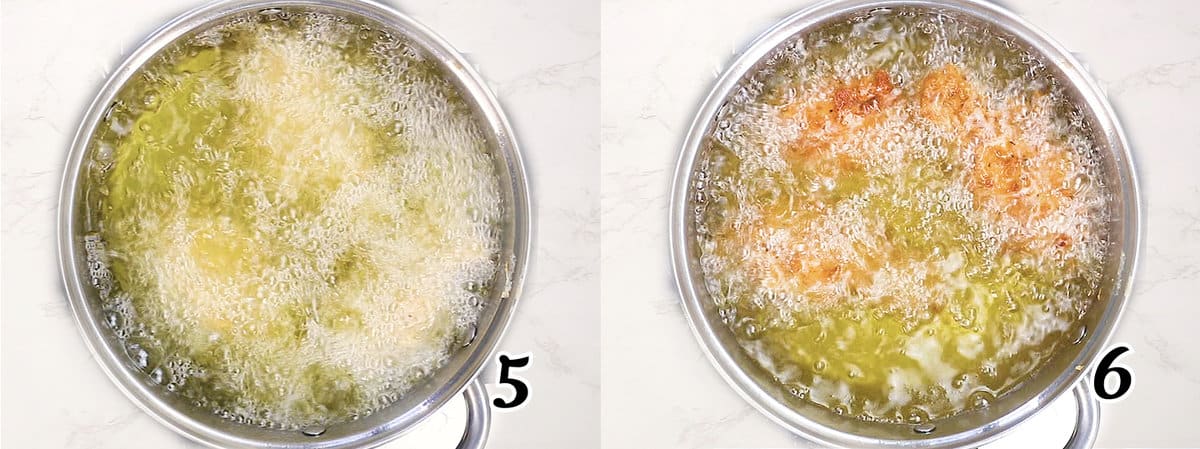
Fry Your Chicken Legs
- Preheat oil in your deep fryer or deep cast iron skillet to 375℉/190℃. It sounds hot, but the temperature will drop once you add chicken.
- Fry – Slowly and carefully place the chicken legs in the hot oil with tongs. Work in batches, so you avoid overcrowding your skillet. Fry the chicken legs until golden, turning once every 10-15 minutes, depending on the legs’ size. Chicken legs are good to go when they’re no longer pink inside and their juices run clear (internal temperature 165℉/75℃). (Photos 5-6)
- Drain the chicken legs and put them on paper towels. As soon as the oil drains off, transfer them to a wire rack. Repeat with the remaining chicken legs. (You can keep the rack of fried chicken legs in a 200℉/90℃ oven to keep them warm while frying the rest.
- Serve – Let them cool for at least 10 minutes before serving.
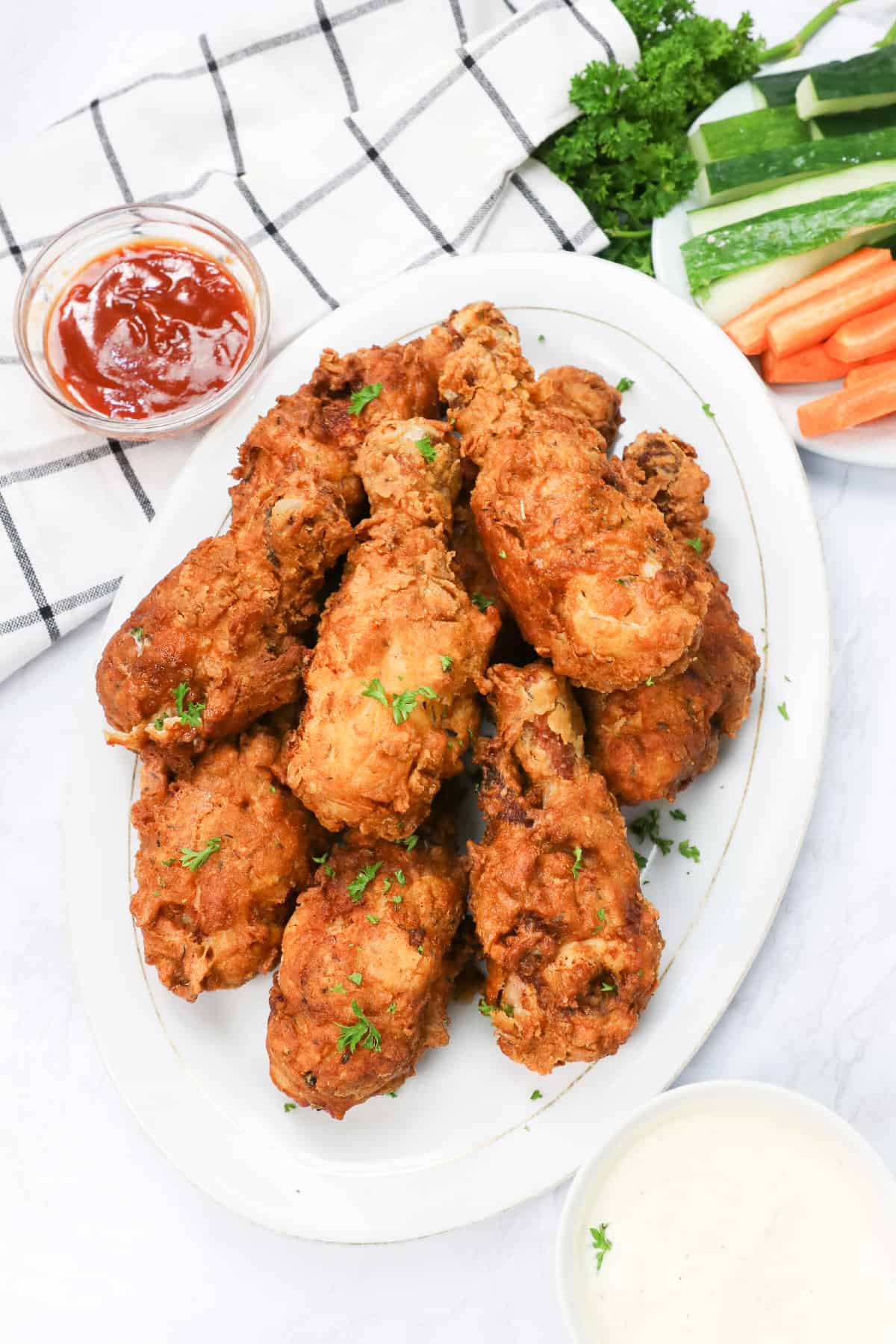
- Meat Swap: You can use whatever cut of meat you like for this recipe. Chicken thighs or wings work. And pork chops love this recipe.
- Make it Spicy: Double up on the cayenne, red pepper, and hot sauce in the marinade if you’re a hothead. ❤️
- Go Chinese: Soy sauce, sesame oil, and ginger added to the marinade make super tasty fried chicken legs.
- Honey Stung: Add some sweetness to your chicken with a popular Caribbean fried chicken. Just mix ½ cup of honey and two tablespoons of raspberry or cider vinegar and then add it to your marinade. But adjust the temperatures when frying, as the honey can make the chicken brown faster.
- Air Fryer Chicken Legs: Make this ideal comfort food almost healthy by spritzing the air fryer basket and the chicken legs with cooking oil. Preheat your air fryer to moderately hot (375℉/190℃) and arrange the breaded chicken legs in the basket in a single layer. Cook the chicken legs for about 20 minutes.
- Let the breaded chicken legs rest before frying. That allows the breading to crust and the chicken to cook evenly.
- When frying, check your oil’s temperature. Because if it’s too hot, the outside will burn, and if it’s not hot enough, they’ll get soggy and greasy.
- Move your fried chicken from the paper towel to the rack as quickly as possible so it doesn’t stick and start to steam.
This is a great recipe to make ahead. Marinate and bread your chicken legs, then refrigerate in an airtight container or ziplock bag for a day or two. You could also freeze them for a month or two at this point.
If frozen, thaw the chicken overnight in the fridge. When ready to heat up the oil, bring the chicken to room temperature for up to 30 minutes (not much longer for food safety). Fry them up per the recipe instructions.
Or you can marinate your chicken in the buttermilk mixture for up to 24 hours (you don’t want it too marinated). And make sure the marinade completely covers the chicken.
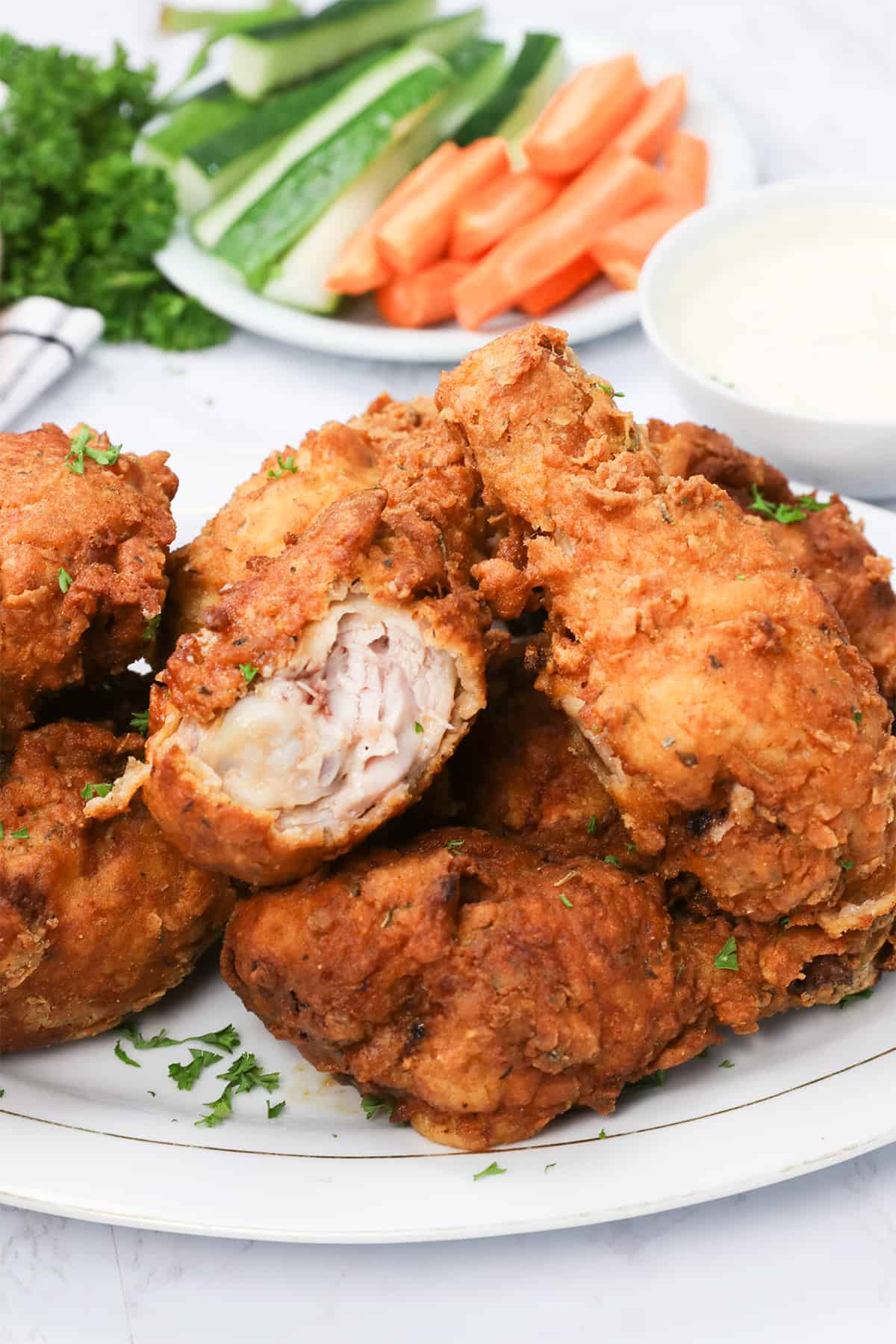
Crispy Fried Chicken Legs
FAQ
How long do chicken legs take to fry?
Fry chicken, uncovered, in the preheated deep fryer, turning occasionally, until golden brown, crispy, and the juices run clear, 25 to 30 minutes. An instant-read thermometer inserted near the bone should read 165 degrees F (74 degrees C).Aug 22, 2024
How long do chicken legs take in a frying pan?
Sear over low heat for about 10 minutes, occasionally pressing down for an even sear. Once golden brown, flip and sear the other side for another 7 minutes. Pierce the chicken with a skewer to check for doneness. If the juice is clear, remove from the pan.
How long does chicken take to fry on the stove?
Cook chicken in oil, skin sides down, about 10 minutes or until light brown; reduce heat to low. Turn chicken skin sides up. Cook uncovered about 20 minutes, without turning, until juice of chicken is clear when thickest pieces are cut to bone (at least 165°F).
Is 20 minutes enough to fry chicken?
Fry at a relatively low temperature. As long as you are comfortably over the boiling point of water, steam form the chicken will be leaving fast enough to block oil from coming in. Turn the chicken from time to time. About every ten minutes, with a planned frying time of 20 to 30, depending on the size.
